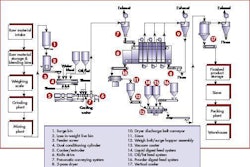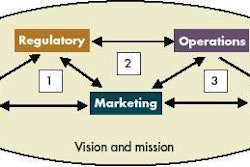Dear China: Thanks for your low labor costs and the low-priced petfood ingredients. Also, thanks for letting us outsource our pollution to you, your fast, flexible modern manufacturing systems and for allowing us to make bigger profits. But, for our relationship to remain strong, please do something about your sad lack of adequate quality assurance. You need a much better regulatory infrastructure.
So far, the economic relationship with you has been beneficial overall for most countries. But I'm worried about the long-term. Will our relationship lead to stifled opportunity for workers in developed nations and a weakening of our efforts to stay ahead in the global economy? I know these are not really your problems. I guess it's time for us to make better choices in our relationship so that we can protect our future.
China makes, the world takes
The preceding was inspired by an article I just read on the the Atlantic Monthly website (www.theatlantic.com). The article, "China makes, the world takes," is by James Fallows, a journalist based in Shanghai. In it, he points out that, for brand owners, the real money is in brand name and retail - the two areas where developed economies are strong. China's strength is in fast and low-cost manufacturing, at least for now.
Companies often turn to China when they have built up a brand name and relationships with retailers and need to save time and money in manufacturing a product. That is where China can help, says Fallows, because it has factories for many products that are better than factories in any other country.
Happy with crappy?
At the moment, the primarily young women in Chinese factories are not taking jobs from highly developed economies, says Fallows, because in such countries these assembly-type tasks would be done by machines. But the Chinese goal is to build toward something more lucrative.
Many predict the climb to more lucrative jobs will be slow for Chinese industries, because they have so far to go in bringing their design, management and branding efforts up to world standards. China has a limited pool of executives with adequate foreign-language skills and experience working abroad, notes Fallows. Another problem is that too often the Chinese outlook toward quality control is "happy with crappy." But that is changing.
Are high-paying jobs next?
Fallows emphasizes that higher-paying jobs are associated with innovations that stem from areas where China is weak:
- Strong universities with good independent research;
- Intellectual property protection;
- The rule of law and sanctity of contacts; and
- An ethic of trust.
Developed economies need not be hostile toward China's rise, according to Fallows, but they should be wary about its eventual effects. He contends, "The US is the only nation with the scale and power to try to set the terms of its interaction with China rather than just succumb." So starting now, we need to consider the economic, environmental, political and social goals we care about defending as Chinese influence grows.
Finally, consider what President John F. Kennedy said in 1963: "Liberty without learning is always in peril. To govern is to choose and making wise decisions requires the best of all of us. We must move ahead swiftly." Meanwhile over the past 30 years, at least in the US, high school graduation rates have plummeted.



.png?auto=format%2Ccompress&fit=crop&h=167&q=70&w=250)













